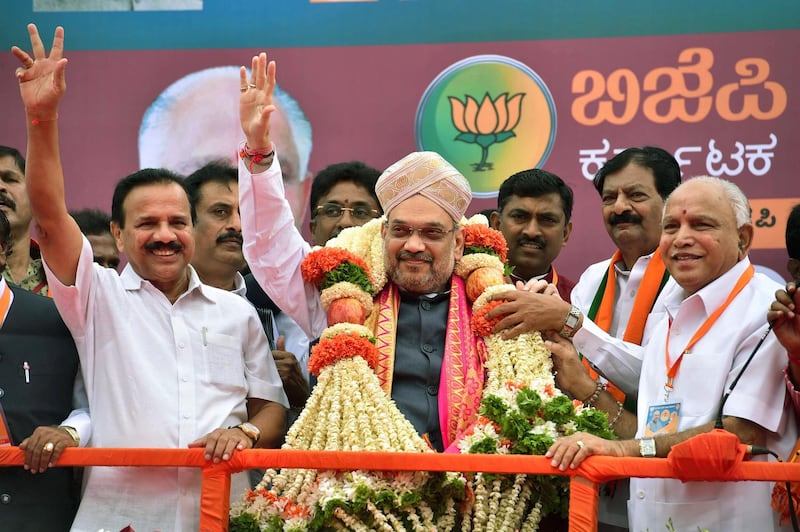An investigation by an Indian magazine has raised suspicions about the death of a judge who was presiding over a murder trial in which Amit Shah, now president of the ruling Bharatiya Janata Party, was among the accused.
In articles published on Monday and Tuesday, the family of Brijgopal Loya, the deceased judge, told the Delhi-based magazine Caravan that they still had questions about the circumstances of his death, allegedly of a heart attack, in December 2014.
Loya’s sister, Anuradha Biyani, also told the magazine that he had turned down a bribe of one billion rupees (Dh57 million), offered to him by the then-chief justice of the Mumbai high court, to rule in favour of Mr Shah and others accused in the case. The judge, Mohit Shah, has not responded to the allegations.
The Caravan report is the first time Loya's family have made their suspicions public. They said they first wrote to Mr Shah but received no response.
The murder in question was of Sohrabuddin Sheikh, who had a criminal record of extortion and arms smuggling. Police in the state of Gujarat also accused Sheikh of having links with the Lashkar-e-Taiba terrorist group in Pakistan and of planning political assassinations.
Members of the Gujarat police force said they killed Sheikh during an exchange of fire on a highway near Ahmedabad, the state's biggest city, on November 26, 2005. A year later, a Gujarati newspaper reported that state police officers had in fact arrested Sheikh from a bus three days earlier, stopping the vehicle in the middle of the night as it drove through Andhra Pradesh state.
A special investigation ordered by the supreme court in 2007 found that the police had killed Sheikh in a “fake encounter”— an extrajudicial execution portrayed as a shoot-out in which the suspect was killed while resisting arrest. Sheikh’s wife Kauserbi and a friend, Tulsiram Prajapati, who were on the bus with him, were later killed by police as well. Prajapati was shot in another "encounter", police said, while Kauserbi was strangled and cremated, investigators later discovered.
“A special attempt was made to destroy a human witness,” the supreme court said after seeing the investigation report, referring to Prajapati's execution.
The investigators attributed the murders to three police officers but also accused Amit Shah, then the home minister of Gujarat, of ordering Sheikh’s killing. Phone records showed 331 calls between Mr Shah and the policemen in the weeks leading up to the killing.
Mr Shah was, and continues to be, the closest confidant of prime minister Narendra Modi. Mr Modi, who was Gujarat’s chief minister at the time, was also investigated but not charged.
The case went to trial in 2012 in a special court set up by the federal Central Bureau of Investigation (CBI) in Mumbai. On the directions of the supreme court, the case was to be heard by a single judge who could not be transferred or substituted until a verdict was delivered.
But a month after the BJP won national elections in May 2014, its government transferred the first judge, J T Utpat. Loya, his replacement, died in December. A third judge, M B Gosavi, acquitted Mr Shah of all charges barely two weeks after Loya's death, saying the investigators had implicated him for “political reasons”.
The three police officers were also acquitted over the next year and a half.
Loya's family told Caravan that he had travelled to Nagpur to attend a wedding, and that his last call home was on the night of November 30. Early the next morning, his wife, father and sisters all received phone calls telling them that Loya, who was 48, had died of a heart attack and that his body would be sent home after a post-mortem.
When Loya's body arrived, Ms Biyani, who is a doctor, noticed that all was not right. "There were bloodstains on the neck at the back of the shirt," she told Caravan. His phone's contents had been deleted.
The post-mortem report listed the time of death as 6.15 on the morning of December 1 — by which time Loya’s family had already been called and told of his demise. The report was signed by someone who claimed to be Loya’s relative, but his family did not recognise the name.
A source at the hospital where the post-mortem was held told Caravan that instructions had come down to "cut up the body as if the PM [post-mortem] was done and stitch it up". Further, among the people who contacted Loya's family to relay news of his death was a man identifying himself as a worker of the Rashtriya Swayamsevak Sangh (RSS), the Hindu nationalist outfit to which Mr Shah and many other BJP leaders belong.
The BJP has not yet responded to Caravan's revelations.
On Wednesday, a group of lawyers and social activists announced plans to seek a fresh investigation into Loya’s death.
“This is not just a case of a mysterious death but also about things that took place prior to his death,” said Shabnam Hashmi, one of the human rights activists. “The story not just tells about the immense pressure that Loya was in, but also how efforts were being made by none other than a top judge to influence him.”





